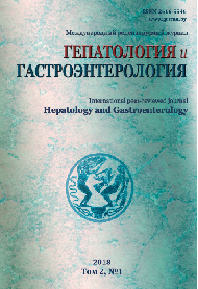IRRITABLE BOWEL SYNDROME AS CONFLICTOGENIC FACTOR IN THE PRACTICE OF THE GASTROENTEROLOGIST

Abstract
The article discusses doctor-patient conflict preventing techniques – an innovative direction in Russian gastroenterology. Irritable bowel syndrome is a typical proconflicogenic disease due to its onset and course. That is why it is a common reason of patient's distrust to the gastroenterologist recommendations. There is a number of psychological, social and legal consequences for the doctor in case of destructively closed conflicts with the patient.
The doctor have to possess conflictological skills and negotiation techniques to increases the likelihood of constructively resolved contradictions. The article describes psychological basics of the patient's aggressive behavior, explains possible interpretations and gives practical advices, how to formulate a conflict elimination response. There are also listed active listening, persuasion, conflict-free response to aggression, non-verbal influence on the interlocutor and dialogue management techniques. Moreover, some examples of conflicting doctor's statements are analyzed and constructive alternatives are recommended.
References
1. Talley NJ. Conquering Irritable Bowel Syndrome. 2nd ed. Beijing[China]: People’s Medical Publishing House-USA; 2013. 198 p.
2. Burulova OE, Kozlova IV, Mjalina JuN. Sindrom razdrazhennogo kishechnika kak biopsihosocialnoe zabolevanie [Irritable Bowel Syndrome as a Biopsychosocial Disease]. Saratovskij nauchno-medicinskij zhurnal [Saratov Journal of Medical Scientific Research]. 2012;8(2):232-237. (Russian).
3. Ob osnovah ohrany zdorovja grazhdan v Rossijskoj Federacii. Federalnyj zakon. [On the fundamentals of protecting the health of citizens in the Russian Federation. The federal law] [Internet]. Available from: http://www.consultant.ru/document/cons_doc_LAW_121895 (Russian).
4. Olejchik IV. Psihozy i ih lechenie [Psychoses and their treatment] [Internet]. Moskva: Rossijskaja Akademija Medicinskih Nauk; 2004. Available from: http://www.psychiatry.ru/stat.php?-num=119. (Russian).
5. Smulevich AB. Depressii v obshhej medicine. Rukovodstvo dlja vrachej [Depression in general medicine. A guide for doctors]. Moskva: Medicinskoe Informacionnoe Agentstvo; 2001. 256 p. (Russian).
6. Nuller JuL, Mihalenko IN. Affektivnye psihozy [Affective psychosis]. Leningrad: Medicina; 1988. 264 p. (Russian).
7. Ivanova EN. Kommunikativnye instrumenty konfliktologa [Communicative tools of the conflictologist]. St-Petersburg: Sankt-Peterburgskoe filosofskoe obshhestvo; 2008. 236 p. (Russian).
8. Dollard J, Doob LW, Miller NE, Mowrer OH, Sears RR. Frustration and Aggression. New Haven: Yale University Press; 1939. 209 p.
9. Cygankov BD, Malygin JaV. Mnogofaktornaja model udovletvorennosti medicinskoj pomoshhju stacionarnyh pacientov, stradajushhih pogranichnymi psihicheskimi rasstrojstvami [Multivariate model of satisfaction with medical care for inpatients suffering from borderline mental disorders]. Problemy socialnoj gigieny, zdravoohranenija i istorii mediciny [Problems of social hygiene, health and history of medicine]. 2015;23(1):23-25. (Russian).
10. Atvater I. Ja vas slushaju. Sovety rukovoditelju, kak pravilno slushat sobesednika [I’m listening to you. Tips for the leader, how to properly listen to the interlocutor]. Moskva: Jekonomika; 1988. 111 p. (Russian).
11. Fekseus H. Iskusstvo manipuljacii [The art of manipulation]. Moskwa: Ripol Klassik; 2010. 272 p. (Russian).
12. Fisher R, Juri U, Patton Ju. Peregovory bez porazhenija. Garvardskij metod [Negotiations without defeat. Harvard Method]. Moskwa: Mann, Ivanov i Ferber; 2012. 272 p. (Russian).
13. Shulc OE. Prakticheskoe primenenie sokratovskogo dialoga v processe dianaliticheskogo konsultirovanija [Practical application of the Socratic dialogue in the process of dialanal counseling]. Arhiv klinicheskoj i jeksperimentalnoj mediciny [Archive of Clinical and Experimental Medicine]. 2014;23(1):108-112. (Russian).
14. Baburin IN, Karavaeva TA, Kolotilshhikova EA, Lysenko IS. Issledovanie lokusa kontrolja u bolnyh s nevroticheskimi i nevrozopodobnymi rasstrojstvami [Study of the locus of control in patients with neurotic and neurosis-like disorders.]. Vestnik Juzhno-Uralskogo gosudarstvennogo universiteta. Serija: Psihologija [Bulletin of the South Ural State University. Series: Psychology]. 2011;(29):47-52. (Russian).
15. Danilov DS, Morozova VD, Korobkova IG, Lukjanova TV. Sindrom razdrazhennogo kishechnika v praktike psihiatra (problema nozologicheskoj samostojatelnosti) i vozmozhnost ego lechenija antidepressantami (na primere jeffektivnosti paroksetina) [Irritable bowel syndrome in the practice of a psychiatrist (the problem of nosological independence) and the possibility of its treatment with antidepressants (on the example of paroxetine effectiveness)]. Nevrologija, nejropsihiatrija, psihosomatika [Neurology, neuropsychiatry, psychosomatics]. 2013;5(2):46-51. doi:10.14412/2074-2711-2013-2413 (Russian).

















1.png)






